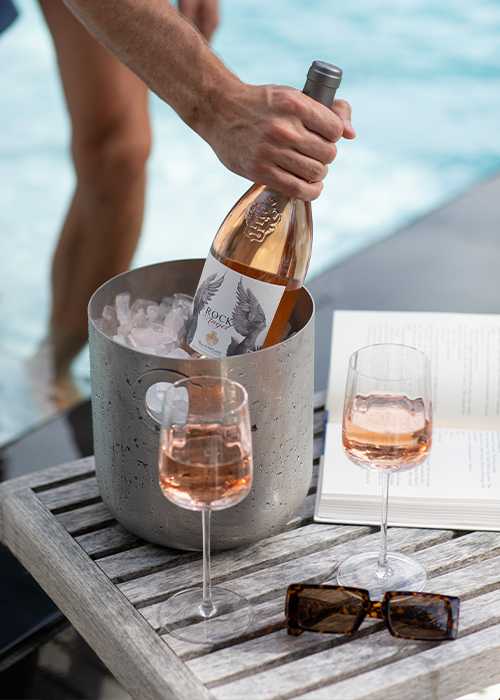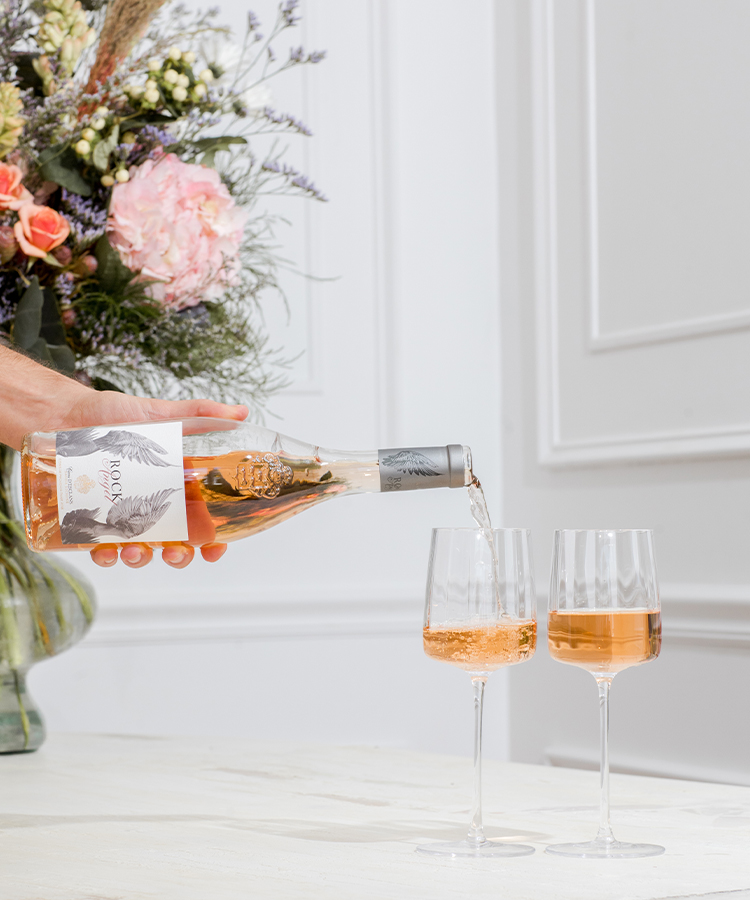
Rock Angel may have given you glimpses of warmer weather while you sipped it during an après ski in the Swiss Alps or while you lounged on a yacht in Miami, but with summer fast approaching, Rock Angel is ready to be your rosé of choice for the upcoming season. There’s something about the clean, crisp brightness of a well-made rosé that makes everything, well, rosier. A good, chilled rosé sips beautifully on its own, of course, but also pairs with a wide variety of foods, from cheese and fruit, to oysters, to pastas, pizzas, and more. This year, consider elevating your rosé experience with Rock Angel Côtes de Provence Rosé from Château d’Esclans.
Rosé wines have a long history and may actually have been some of the earliest “reds” made, when ancient winemakers learned to leave pressed grape juice in contact with red grape skins during the initial steps in fermentation. But during the last half of the 20th century, rosé developed a reputation as brash and uninteresting (or overtly sweet), and many wine drinkers actively avoided them. The category had little standardization and even less respect afforded to it. However, in recent years, winemakers are once again taking their rosés more seriously, focusing on grape varietals, regions, and techniques that work best for these typically young wines (in general, rosés are best enjoyed within a year or two of their vintage).
You may already be familiar with Rock Angel’s sister label, Whispering Angel. That brand has been around since the mid-2000s and helped usher in a new era of rosé wine appreciation. When it launched, Whispering Angel entranced wine drinkers with a summery freshness that is lush, fruit-driven, and fragrant. It’s affordable and accessible and was the perfect introduction to the category for a new generation of oenophiles. More than a decade after the launch of Whispering Angel, Rock Angel provides an experience even more sophisticated, complex, and rewarding. Consider it the more grown-up sibling, ready for a day at the harbor or a night on the town. Many rosés work best in context — designed to complement the sun, good company, and the vibe of the moment. But Rock Angel is intended to be savored and explored on its own merits. A carefully crafted wine, it’s well balanced, full of inviting flavors and aromatics. Rock Angel is an elegant rosé with a high- energy vibrancy wrapped in a label designed by artist Hello Von, offering a beautiful yet high- energy bottle.

Rock Angel is another brainchild of winemaker Sacha Lichine. Born in France and trained in every aspect of the wine industry in both France and America, Lichine specialized in the red blends of his native Bordeaux. He became passionate about rosé wines when he acquired d’Esclans in 2006. Since then, LVMH entered into a joint venture with Château d’Esclans in 2019 which has helped the brand continue on its meteoric growth trajectory. At the time, Lichine advocated for a “Rosé Renaissance.” He and other winemakers helped customers discard outdated stereotypes and rediscover the joys of these pale pink, soft salmon, brick orange, or light purple wines. In the past decade, rosé wines have become the “must have” wine from festivals, to yacht outings, and certainly on Instagram hashtags (i.e. #roseallday), and appeal to all genders and ages.
What gives Rock Angel its own unique rosé personality? First, grapes are harvested from Château d’Esclans’ own estate vineyards in Provence, with at least 70 percent of the grapes estate-grown and hand-sorted for size and quality. Grapes are harvested between sunrise and noon so they are still cool in temperature. The initial destemming and slight crush are conducted in a temperature-controlled space, kept below about 46 degrees Fahrenheit (to minimize oxidation, which can affect the wine’s taste). Blending Grenache, Cinsault, and the white wine varietal Rolle (Vermentino), the wine is then partially barrel-fermented in 600-liter (about 158-gallon) French oak casks. About 25 percent of the wine that ends up in a bottle is barrel-fermented, with the other 70 percent vinified in large stainless-steel tanks. Uncommon for rosés these days, the juices are free run and first press, not macerated with the skins. Therefore, much of the wine’s color comes from the pressing of the red grapes, and from the barrel fermentation.
All of this hard work results in an elegant, very pale pink rosé, with complex aromas of peach, spring flowers, candied orange, and fresh berries. On first sip, hold it in your mouth for a moment and really explore the flavors and texture. The wine is medium-bodied, luxurious, and silky. Some of this lush mouthfeel is the result of the grapes used, some is the dependence on free-run juices, and some of the rich texture comes from that time spent fermenting in oak. However, Rock Angel is in no way an “oaky” wine. Flavors reflect much of what comes across in the bouquet: a crisp, fruity palate with notes of peach, bright citrus, a hint of roasted nuts, and a lightly mineral-driven finish. Rather than thinking about it simply as a deck chair rosé served alongside cheese and almonds (which you can certainly do), consider it your primary wine with dinner. From saucy fish entrees to spicy sausages, from Thai noodle dishes to pizza, the wine shines alongside the meal.

Rock Angel is in the premium category (SPR about $40). But you definitely get what you pay for here: a wine that takes rosé to the next level, a wine that can seamlessly transport you from day to night, as an aperitif, dinner wine, or even nightcap in swanky lounge. It’s a wine you’ll be proud to serve, gift, or enjoy during a time of celebration. It’s the sort of wine that’s approachable and easy to drink, yet lends itself to truly be passionate about what’s in the glass.
It started with a Whisper and now we’re ready to Rock!
This article is sponsored by Rock Angel.
